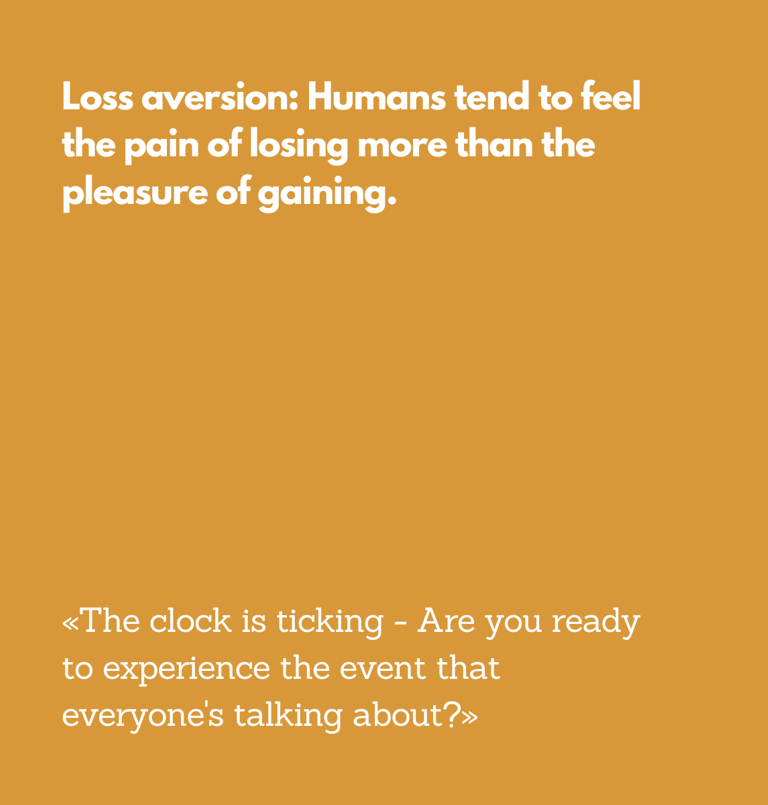Human Biases in Subject Lines (Part I)
We're diving deep into four powerful biases: Loss aversion, Bandwagon effect, Overconfidence bias, and Reactance.
COPYWRITING
Rostyslav
7/31/20233 min read
The Sneaky Mind Game: Loss Aversion Bias - Why We Hate Losing More Than We Love Winning
Hey there, fellow curious minds! Today, we're diving deep into the fascinating world of behavioral economics to uncover a hidden gem called Loss Aversion Bias. Picture this: would you rather lose $50 or win $50? The answer might surprise you.
Loss aversion bias, a prominent concept in behavioral economics, reveals a peculiar quirk in human psychology - our natural tendency to loathe losing more than we adore winning. Let's unravel the mysteries behind this sneaky mind game.


What is Loss Aversion Bias?
Loss aversion bias stems from the notion that people place greater importance on avoiding losses compared to the potential of gaining something of equal value. In other words, the emotional impact of losing something is approximately twice as powerful as the pleasure of gaining something similar. Our brains are wired to be cautious, even if it means missing out on potential gains.
The Fear of Regret
This bias is deeply connected to the fear of regret. We've all experienced that pang of remorse when making a decision that leads to a loss. This emotion is so potent that it can cloud our judgment and cause us to make irrational choices to avoid facing similar situations in the future.
Real-Life Applications
Loss aversion bias plays a significant role in various aspects of our lives:
a. Investment and Finance: Investors tend to hold on to losing stocks longer than winning stocks, hoping to recoup the losses. This behavior may lead to missed opportunities and even larger losses.
b. Marketing and Sales: Businesses often use limited-time offers or emphasize potential losses to persuade customers to take immediate action. Phrases like "Last chance!" and "Limited supply!" prey on our fear of missing out.
c. Negotiations: In negotiations, both parties may become more focused on avoiding concessions rather than seeking mutual benefits, resulting in unsatisfactory outcomes.
Overcoming Loss Aversion Bias
Recognizing and understanding loss aversion bias is the first step to overcoming its influence on our decisions. Here are a few strategies to help:
a. Awareness: Being aware of the bias empowers us to make more objective choices. Take a moment to assess if your aversion to loss is driving your decision-making.
b. Risk Diversification: In investment and finance, diversifying your portfolio can mitigate the impact of individual losses and balance overall risk.
c. Framing: Marketers can present opportunities in a way that emphasizes potential gains rather than losses. By highlighting positive outcomes, customers may be more motivated to take action.
Embrace a Balanced Perspective
Understanding loss aversion bias doesn't mean shunning caution altogether. Instead, it encourages a balanced perspective. Sometimes avoiding losses is vital for survival, but by being mindful of this bias, we can make more informed and rational choices.
In conclusion, loss aversion bias is a powerful mental construct that influences how we approach decisions in various aspects of life. Whether in investments, negotiations, or everyday choices, our fear of loss can overshadow our potential for gain. Nevertheless, armed with this knowledge, we can tame this sneaky mind game and make choices that lead to better outcomes.
So, dear reader, the next time you're faced with a decision, remember - it's not just about winning or losing, it's about understanding the bias that lies within us all. Happy decision-making!
